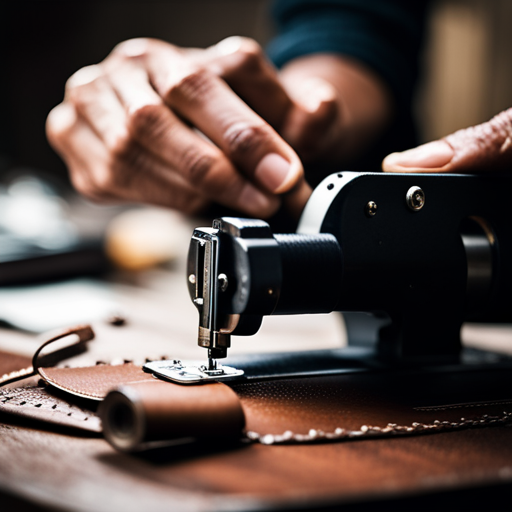Step into the world of ethical artisan products, where each creation is a masterpiece woven with love and purpose.
Discover the craftsmanship that brings these products to life, as skilled artisans pour their heart and soul into every stitch, every brushstroke, and every carve.
From sustainable textiles to handcrafted pottery, this journey will unveil the beauty of imperfection and the commitment to sustainability.
Embark on this exploration and experience the artistry that lies within ethical artisan products.
The Art of Handweaving: Preserving Traditional Techniques in Ethical Artisan Textiles
You should appreciate the intricate beauty of handweaving while supporting ethical artisan textiles.
Handweaving is a centuries-old technique that involves creating textiles by interlacing threads on a loom. Each piece is carefully crafted by skilled artisans who’ve dedicated their lives to mastering this art form.
When you choose to support ethical artisan textiles, you aren’t only purchasing a beautiful product, but also helping to preserve traditional techniques and support sustainable livelihoods for these artisans.
Handweaving allows for unique and intricate designs that can’t be replicated by machines. The attention to detail and the love put into each piece is evident, making it a truly special and one-of-a-kind product.
Unveiling the Skillful Hands: The Artisans Behind Ethical Artisan Pottery
There are numerous talented artisans behind ethical artisan pottery, and they play a vital role in creating unique and sustainable pieces. These skilled individuals pour their passion and expertise into every creation, ensuring that each piece tells a story and reflects their craftsmanship.
Here’s why the artisans behind ethical artisan pottery are worth celebrating:
– Expertise and Experience: Artisans possess years of experience honing their craft, allowing them to create intricate and flawless designs.
– Preservation of Traditions: These artisans help preserve traditional pottery techniques that have been passed down through generations, keeping cultural heritage alive.
– Sustainable Practices: Ethical artisans prioritize sustainable materials and production methods, ensuring that their pottery has a minimal impact on the environment.
From Forest to Furniture: Sustainable Sourcing and Ethical Woodworking
To create ethically sourced furniture, it’s important to consider both sustainable sourcing and ethical woodworking practices.
When it comes to sustainable sourcing, look for furniture made from responsibly harvested materials. This means choosing wood that comes from well-managed forests, where trees are replanted and biodiversity is protected. Additionally, consider furniture made from recycled or reclaimed materials, reducing the need for new resources.
Ethical woodworking practices involve treating workers fairly, ensuring their safety and providing fair wages. It also means using non-toxic finishes and adhesives that are safe for both the workers and the environment.
The Beauty in Imperfection: Embracing Handmade Quirks in Ethical Artisan Jewelry
Embrace the uniqueness of each handmade piece, as the beauty in imperfection shines through in ethical artisan jewelry. When you wear a piece of ethical artisan jewelry, you aren’t just wearing a regular accessory, but a work of art that tells a story.
Here’s why you should embrace the imperfections:
– Each piece is handmade with love and care, making it truly one-of-a-kind.
– The imperfections add character and charm to the jewelry, giving it a distinct personality.
– By supporting ethical artisan jewelry, you’re promoting sustainable practices and fair trade.
Crafting Sustainability: Exploring the Eco-Friendly Practices in Ethical Artisan Products
When supporting ethical artisan products, you’re actively contributing to the crafting of sustainability through exploring eco-friendly practices.
By choosing to purchase products that are made with sustainability in mind, you’re making a conscious decision to support artisans who prioritize the environment. These artisans utilize eco-friendly materials, such as organic cotton, recycled metals, and natural dyes, to create their products. They also implement sustainable production methods, such as reducing waste, conserving energy, and promoting fair trade practices.
Moreover, ethical artisans often collaborate with local communities, providing them with fair wages and empowering them economically.
By supporting these practices, you aren’t only investing in high-quality and unique products, but also promoting a more sustainable future.
Together, we can make a difference by choosing ethical artisan products and encouraging eco-friendly practices.
Conclusion
As you delve into the world of ethical artisan products, you’ll discover a tapestry of skill, passion, and sustainability. From the intricate handweaving techniques to the earth-friendly sourcing of materials, these artisans are crafting products that truly stand out.
Embrace the quirks and imperfections that make each piece unique, and join the movement towards a more conscious and thoughtful way of consuming.
So next time you’re searching for that special something, remember to choose ethical artisan products that not only make a statement but also preserve traditional craftsmanship for generations to come.
